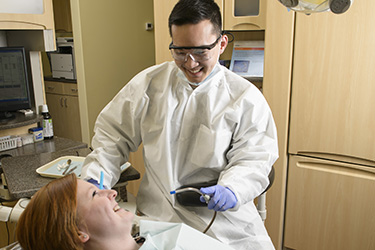Dentistry
On this page:
Professional Overview
Dentistry is the branch of the healing arts and sciences devoted to maintaining the health of the teeth, gums, and other hard and soft tissues in and around the mouth. A dentist is a doctor, scientist, and clinician dedicated to the highest standards of health through prevention, diagnosis, and treatment of oral diseases and conditions.
Dental schools are doctoral-level programs and are four years in length. Becoming a recognized specialist usually requires from one to four years of additional training beyond the dental degree.
General Pre-Dental Prerequisite Coursework; Wright State Specific Courses
Most dental schools require the following prerequisites:
- General Biology (with lab): 8 semester hours (BIO 1120, BIO 1150)
- General Chemistry (with lab): 8 semester hours (CHM 1210, CHM 1220)
- Organic Chemistry (with lab): 8 semester hours (CHM 2110, CHM 2120)
- Biochemistry and Molecular Biology: 3 semester hours (BMB 4210 or BMB 4001)
- Physics (with lab): 8 semester hours (PHY 1110, PHY 1120)
- English: 6 semester hours (ENG 1100, ENG 2100, or 2130)
- Anatomy and Physiology (with lab): 8 semester hours (ANT 3100, ANT 3120)
Note. Individual requirements vary by school. It is important to research individual health professions programs for specific requirements. Contact the Pre-Health Advisor for assistance.
Academic Major
Any major is acceptable if you complete the required prerequisite coursework, recommended extracurricular activities, and present a strong application to dental school. Dental schools seek students who have demonstrated they can do well, particularly in prerequisite courses, and follow their academic interests.
Pre-dental students often major in one of the following since many of the prerequisite courses are part of the major’s academic requirements:
- Biological Science
- Biochemistry
- Chemistry
- Neuroscience
- Physics
- Psychology
- Public Health
- Health Sciences
Presenting a Competitive Application
You should check directly with the schools they plan to apply to for application requirements, information, and timelines. Admissions to health profession schools tend to be very competitive. While there is “no magical formula” for gaining admissions, general expectations include:
- Strong academic performance (3.5 or higher) in both your cumulative and prerequisite courses.
- Scoring highly (20 or higher) on the Dental Admissions Test (DAT).
- Dental schools require extensive familiarity with dentistry to gain an appreciation for and understanding of the profession. Students should:
- Shadow several dentists to gain a realistic perspective of the profession.
- Gain direct patient and/or clinical exposure/experience in several unique and diverse settings and various types of patients.
- Get involved in community service, volunteer experiences, and co- and extracurricular activities on campus.
- Seek leadership responsibility, such as employment, church, community, and school organizations, including coaching, tutoring, and mentoring.
- Conduct research (however, not required) to help you understand scientific literature, how research is conducted, and distinguish credible research.
- demonstrate the ability to balance school and responsibilities outside the classroom, demonstrating your ability to handle the difficult demands of dental school
- Exhibit strong interpersonal skills, the ability to work in teams and among a diverse group of people, and a desire to help others; communicate and listen effectively and possess skills to express your thoughts and ideas.

